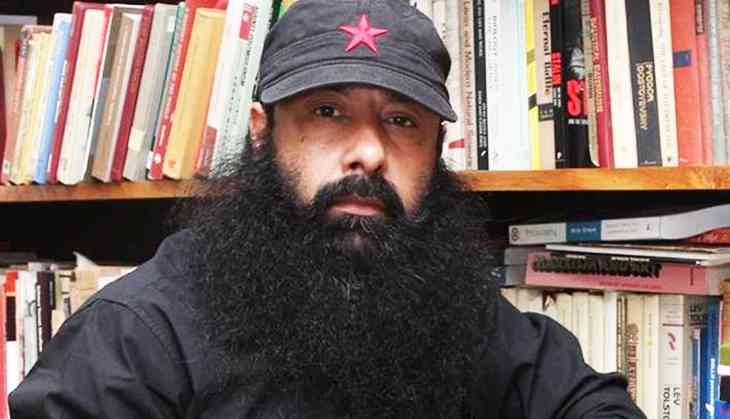'Apocalypse now': Read journalist-poet Manu Kant's latest haikus on Modi's India

"Saare jahaan se acchha, Hindustan hamara
the father lynched over beef
the son serving India"
--------
"The Italian connection of the Congress (I)
oye! Hello BJP!
Remember the Italian and Nazi connections
of the RSS"
Poetry is an urgent freedom of expression and in political times like these in India, it's easy to see why poets such as Chandigarh-based poet Manu Kant turn to the medium to express their exasperation and frustration.
Penned by Kant as part of his collection titled 'From Godse to Gau Rakshaks: Poems Just for Grins' that was published a few weeks ago, the first poem refers to the lynching of Mohammad Akhlaq, a blacksmith in Dadri over allegations of preserving beef in his refrigerator.
The second haiku is about the Hindutva brigade's criticism of Congress president Sonia Gandhi's Italian background while it conveniently tries to forget the oft reported connections of the Rashtriya Swayamsevak Sangh (RSS) with fascist forces.
The collection is the seventh published work of the full time writer who has previously written two books of poetry on Aam Aadmi Party (AAP) leader Arvind Kejriwal, one on writer and activist Arundhati Roy, two on Prime Minister Narendra Modi and one on the working classes in Chandigarh and around.
“I have been looking at the historical roots and the rise of the RSS. Also, at the half secularism and socialism of the Congress - which has not been scientific. The BJP has regressive pronouncements on science and culture. If we continue down this road, we will go back to medieval times,” he says.
According to him, the BJP government under Prime Minister Narendra Modi has not fulfilled the promises it made to the poor when it was voted into power. Despite having said much, it has accomplished nothing.
“Today, Sangh Parivar monitored BJP in power is trying to rewrite the history of the Indian subcontinent with diversified nationalities, religions, languages and cultures as one monolithic nation, that is India. As the poet himself tries to explain in mathematical parallel lines as Hindutva. Only the Hindutva can rule this country as they are Aryans, with Swastika symbol. During these three years we must have found many decorations of Swastika during the Hindu festivals,” reads the foreword of the book written by communist poet, writer and Naxal sympathiser Varavara Rao.
One poem of Manu Kant elaborates on what Rao says:
"Apocalypse now
Ashok Singhal says India
will be a Hindu nation by 2010
and by 2030
the entire world will be Hindu"
Rao writes, “Why Ashok Singhal, the idea of Vishwa Hindu Parishad is generated from Vivekananda's Chicago speech where he tried to establish the Hindu religion greater than any religion in the world. Whoever speaks of a religion for that matter any nation or a country superior than the other is a fascist.”
Of satire and politics
Kant used to be a student of journalism in the erstwhile USSR and while he was there, he witnessed its disintegration. After returning to India in 1993, he tried his hands in different forms of journalism with different publications and eventually took to writing political Haiku poetry.
He is a follower of the ideals of the Soviet leader Joseph Stalin. He derives the subjects for his poems mainly from newspapers and publications which also include the RSS mouthpiece Organizer.
Manu Kant's satirical poetry has covered almost all aspects of Modi regime that have been making the headlines. His book includes two poems on Kohinoor explaining two different dimensions of the politics of the Indian state. The first one reads :
"Kohinoor debates
gifted or stolen
& Kashmir & the Northeast"
The second poem goes quite a bit beyond:
"Kohinoor debate
gifted or stolen ?
The story of the two other Kohinoors –
Lalit Modi & Vijay Mallya
certainly gifted to the British"
On the issue of the former Punjab government imposing cow cess on liquor he wrote:
'Gau seva' tax
perhaps time to also institute
'Muslim seva' tax and 'Christian seva' tax
all over India"
According to the poet, bourgeois poets from the middle class are not highlighting the plight of the masses. Real poetry emerging from other places, such as Uttar Pradesh, is not getting prominence anywhere, he says.
As to why people no longer react to poetry, he says because poems no longer offer hope. "India remains oppressed. There is so much religious belief and superstition. They have not been free from the fascism that has continued for the last 5,000 years in the form of caste oppression. They are frustrated and give perplexed expression,” he says, adding that the Left forces that today stand splintered have a role to play which they have failed at.
Looking at the political future of India, Kant feels that the Modi phenomenon will unravel once the mainstream opposition parties are able to get their act together. But when that day comes, he rues, is anybody's guess.
First published: 19 August 2017, 14:59 IST

